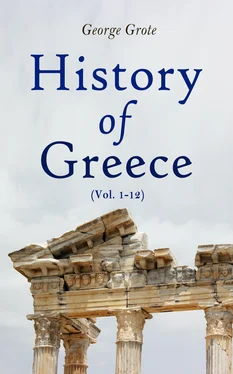A powerful and important progeny, also, was that of Styx, daughter of Oceanus, by Pallas; she had Zêlos and Nikê (Imperiousness and Victory), and Kratos and Bia (Strength and Force). The hearty and early coöperation of Styx and her four sons with Zeus was one of the main causes which enabled him to achieve his victory over the Titans.
Zeus had grown up not less distinguished for mental capacity than for bodily force. He and his brothers now determined to wrest the power from the hands of Kronos and the Titans, and a long and desperate struggle commenced, in which all the gods and all the goddesses took part. Zeus convoked them to Olympus, and promised to all who would aid him against Kronos, that their functions and privileges should remain undisturbed. The first who responded to the call, came with her four sons, and embraced his cause, was Styx. Zeus took them all four as his constant attendants, and conferred upon Styx the majestic distinction of being the Horkos, or oath-sanctioner of the Gods,—what Horkos was to men, Styx was to the Gods. 13
Still further to strengthen himself, Zeus released the other Uranids who had been imprisoned in Tartarus by their father,—the Cyclôpes and the Centimanes,—and prevailed upon them to take part with him against the Titans. The former supplied him with thunder and lightning, and the latter brought into the fight their boundless muscular strength. 14Ten full years did the combat continue; Zeus and the Kronids occupying Olympus, and the Titans being established on the more southerly mountain-chain of Othrys. All nature was convulsed, and the distant Oceanus, though he took no part in the struggle, felt the boiling, the noise, and the shock, not less than Gæa and Pontus. The thunder of Zeus, combined with the crags and mountains torn up and hurled by the Centimanes, at length prevailed, and the Titans were defeated and thrust down into Tartarus. Iapetos, Kronos, and the remaining Titans (Oceanus excepted) were imprisoned, perpetually and irrevocably, in that subterranean dungeon, a wall of brass being built around them by Poseidôn, and the three Centimanes being planted as guards. Of the two sons of Iapetos, Menœtius was made to share this prison, while Atlas was condemned to stand for ever at the extreme west, and to bear upon his shoulders the solid vault of heaven. 15
Thus were the Titans subdued, and the Kronids with Zeus at their head placed in possession of power. They were not, however, yet quite secure; for Gæa, intermarrying with Tartarus, gave birth to a new and still more formidable monster called Typhôeus, of such tremendous properties and promise, that, had he been allowed to grow into full development, nothing could have prevented him from vanquishing all rivals and becoming supreme. But Zeus foresaw the danger, smote him at once with a thunderbolt from Olympus, and burnt him up: he was cast along with the rest into Tartarus, and no further enemy remained to question the sovereignty of the Kronids. 16
With Zeus begins a new dynasty and a different order of beings. Zeus, Poseidôn, and Hadês agree upon the distribution before noticed, of functions and localities: Zeus retaining the Æthêr and the atmosphere, together with the general presiding function; Poseidôn obtaining the sea, and administering subterranean forces generally; and Hadês ruling the under-world or region in which the half-animated shadows of departed men reside.
It has been already stated, that in Zeus, his brothers and his sisters, and his and their divine progeny, we find the present Gods; that is, those, for the most part, whom the Homeric and Hesiodic Greeks recognized and worshipped. The wives of Zeus were numerous as well as his offspring. First he married Mêtis, the wisest and most sagacious of the goddesses; but Gæa and Uranos forewarned him that if he permitted himself to have children by her, they would be stronger than himself and dethrone him. Accordingly when Mêtis was on the point of being delivered of Athênê, he swallowed her up, and her wisdom and sagacity thus became permanently identified with his own being. 17His head was subsequently cut open, in order to make way for the exit and birth of the goddess Athênê. 18By Themis, Zeus begat the Hôræ, by Eurynomê, the three Charities or Graces; by Mnêmosynê, the Muses; by Lêtô (Latona), Apollo and Artemis; and by Dêmêtêr, Persephonê. Last of all he took for his wife Hêrê, who maintained permanently the dignity of queen of the Gods; by her he had Hêbê, Arês, and Eileithyia. Hermês also was born to him by Maia, the daughter of Atlas: Hêphæstos was born to Hêrê, according to some accounts, by Zeus; according to others, by her own unaided generative force. 19He was born lame, and Hêrê was ashamed of him: she wished to secrete him away, but he made his escape into the sea, and found shelter under the maternal care of the Nereids Thetis and Eurynome. 20Our enumeration of the divine race, under the presidency of Zeus, will thus give us, 21—
1. The twelve great gods and goddesses of Olympus,—Zeus, Poseidôn, Apollo, Arês, Hêphæstos, Hermês, Hêrê, Athênê, Artemis, Aphroditê, Hestia, Dêmêtêr.
2. An indefinite number of other deities, not included among the Olympic, seemingly because the number twelve was complete without them, but some of them not inferior in power and dignity to many of the twelve:—Hadês, Hêlios, Hekatê, Dionysos, Lêtô, Diônê, Persephonê, Selênê, Themis, Eôs, Harmonia, the Charities, the Muses, the Eileithyiæ, the Mœræ, the Oceanids and the Nereids, Proteus, Eidothea, the Nymphs, Leukothea, Phorkys, Æolus, Nemesis, etc.
3. Deities who perform special services to the greater gods:—Iris, Hêbê, the Horæ, etc.
4. Deities whose personality is more faintly and unsteadily conceived:—Atê, the Litæ, Eris, Thanatos, Hypnos, Kratos, Bia, Ossa, etc. 22The same name is here employed sometimes to designate the person, sometimes the attribute or event not personified,—an unconscious transition of ideas, which, when consciously performed, is called Allegory.
5. Monsters, offspring of the Gods:—the Harpies, the Gorgons, the Grææ, Pegasus, Chrysaor, Echidna, Chimæra, the Dragon of the Hesperides, Cerberus, Orthros, Geryôn, the Lernæan Hydra, the Nemean lion, Scylla and Charybdis, the Centaurs, the Sphinx, Xanthos and Balios the immortal horses, etc.
From the gods we slide down insensibly, first to heroes, and then to men; but before we proceed to this new mixture, it is necessary to say a few words on the theogony generally. I have given it briefly as it stands in the Hesiodic Theogonia, because that poem—in spite of great incoherence and confusion, arising seemingly from diversity of authorship as well as diversity of age—presents an ancient and genuine attempt to cast the divine foretime into a systematic sequence. Homer and Hesiod were the grand authorities in the pagan world respecting theogony; but in the Iliad and Odyssey nothing is found except passing allusions and implications, and even in the Hymns (which were commonly believed in antiquity to be the productions of the same author as the Iliad and the Odyssey) there are only isolated, unconnected narratives. Accordingly men habitually took their information respecting their theogonic antiquities from the Hesiodic poem, where it was ready laid out before them; and the legends consecrated in that work acquired both an extent of circulation and a firm hold on the national faith, such as independent legends could seldom or never rival. Moreover the scrupulous and sceptical Pagans, as well as the open assailants of Paganism in later times, derived their subjects of attack from the same source; so that it has been absolutely necessary to recount in their naked simplicity the Hesiodic stories, in order to know what it was that Plato deprecated and Xenophanês denounced. The strange proceedings ascribed to Uranos, Kronos and Zeus, have been more frequently alluded to, in the way of ridicule or condemnation, than any other portion of the mythical world.
Читать дальше












